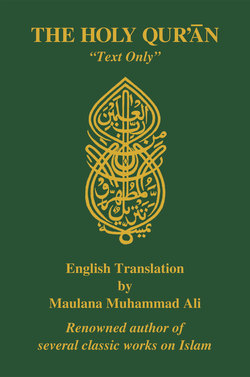Читать книгу The Holy Quran, English Translation, âText Onlyâ - Maulana Muhammad Ali - Страница 48
На сайте Литреса книга снята с продажи.
Chapter 3 Al ‘Imran: The Family of Amran
Оглавление(Revealed at Madinah: 20 sections; 200 verses)
The name of this chapter is taken from the mention of ‘Imran in v. 33. ‘Imran is the same as Amran, the father of Moses and Aaron. It is an appropriate title as the chapter deals with the departure of prophethood from the Mosaic dispensation.
The chapter opens with a statement relating to the Divine origin of the Holy Qur’an as well as the Torah and the Gospel. It then gives a rule of interpretation, neglect of which has led to numerous errors in religious beliefs. This rule of interpretation, which must be borne in mind in interpreting all Divine books, is that every allegorical statement must be interpreted in such a manner that it may not contradict any of the clear principles laid down by Divine revelation. As the Christian religion is based really on the wrong interpretation of certain allegorical statements, the rule is appropriately laid down as a preliminary to a discusson of the Christian religion.
The preliminary remarks of the first section are followed in the second by an assertion of the Unity of Allah, which is laid down as the clear basis of all religions, and its ultimate triumph is predicted. The third section refers to the departure from the house of Israel of the spiritual kingdom which was now being granted to another people; and the last chosen members of the Israelite race are mentioned in the fourth. Among these is Jesus, various misconceptions regarding whom necessitate rather a lengthy discussion in the two sections that follow. The seventh section continues the controversy with the Jews and the Christians, while the eighth deals with their machinations to discredit Islam. The ninth speaks of the testimony of previous Books and prophets to the truth of Islam, while the tenth mentions the overwhelming testimony afforded by the Ka‘bah, the new spiritual centre of the world. This is followed by an exhortation in the following section to the Muslims to remain united if they would achieve triumph, and in view of the coming conflicts they are told in the next to have guarded relations with the Jews, who, while outwardly friendly, were inwardly hostile to the Muslims. The incidents of the battle of Uhud, the causes of the misfortune experienced in it, and how triumph can be obtained are the points discussed from section thirteen to the eighteenth. The nineteenth speaks of the carpings of the People of the Book, while the twentieth deals with the ultimate triumph of the faithful.
The importance of the connection of this with the preceding chapter may be judged from the fact that, taken together, they are termed zahrawan (meaning the two bright and shining ones). The two, in fact, may be treated as a single chapter, as each supplements and explains the other. The 2nd chapter opens with a controversy with the Jews, and deals at length with their contentions, referring only briefly to the Christians. The 3rd chapter opens with a controversy with the Christians, and deals at length with their contentions, referring only briefly to the Jews. Again, the second chapter deals particularly with the necessity of fighting against an enemy who was bent upon the extirpation of Islam, while the third deals with the events of one of the battles which the enemy waged with a view to wipe out Islam by destroying its stronghold in Madinah.
The whole of this chapter was revealed at Madinah and it is generally supposed to be the second or the third in order in the Madinah revelation (Itq). The latter portion, from sec. 13 almost to the end, distinctly relates the incidents of the battle of Uhud, and therefore the third year of the Hijrah may be fixed as the date of its revelation. The first portion, especially that dealing with the birth and ministry of Jesus, is said by some to have been revealed on the occasion of the visit of a deputation of the Najran Christians which took place in the tenth year of the Hijrah, but there is no evidence for it. The whole chapter belongs to the third year of the Hijrah, with the possible exception of v. 61 which speaks of Mubahalah, and may have been revealed on the occasion of the visit of the Najran deputation.
